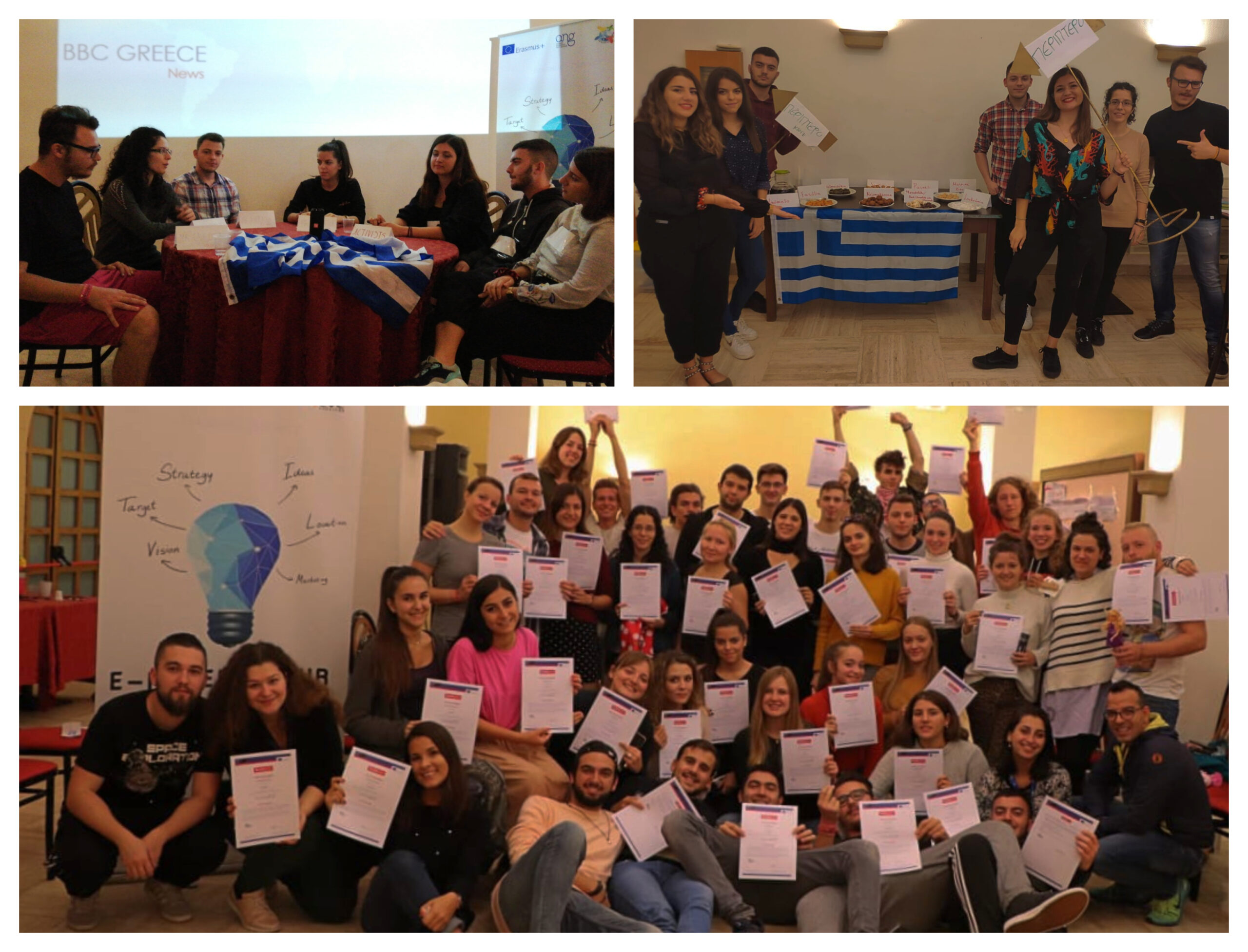
E-ntrepreneur” is a KA1 Youth Exchange project which took place from the 4th until the 12th of November 2019 in Agrigento, Italy under the framework of the Erasmus+ programme. The topic of the project was youth entrepreneurship, unemployment, activism and development of personal skills and knowledge.
Our delegation consisted of: Maria, Angeliki, Thanos, Charis, Maria, Elena and Nikos. All these youngsters represented EN.O GREECE to the fullest, not only through their active participation, but also by creating an article about ”Youth Activism in Greece” and conducting a relevant workshop for the whole group of the project!
Youth Activism in Greece
Activism, a concept closely connected with Volunteerism, is a philosophical theory which supports that the essence of the human is expressed through practical energy and its aim is to intervene in social, political, economic and environmental issues in order to make changes within the community. In other words, overcoming passive observation can lead to radical or gradual alterations of the opinions and behaviors. All in all, activist movements aim at retrofitting the present and the future for the planet and the people indiscriminately.
Activist groups use distinct means to commute their ideology or beliefs in the public and to encourage other people to take action. Most commonly encountered is the Internet or Cyber-activism that deploys the social media and knowledge of technology to represent the activist groups’ purposes, campaigns and useful information about their movement. On the other hand, physical or in-person activism can be presented as non-violent resistance, as protesting through parades, boycotting and art, or as strike action. Finally, activist ideas can be spread through established communities such as schools and universities. Student Activism is on the rise and proves that younger citizens care and are willing to improve political, economic, environmental and social matters. All the above sharing ideology methods can be combined for the purposes of an activist movement or organization.
The different social, political and economic waves created a variety of activist movements overtime in Greece. First of all, Social Activism is represented by Non-Governmental Organizations (NGOs), and by individual activists. Daily, activists offer all their strength and willingness to help minorities in need. A living example is the refugees that arrive at the Greek east coast every day, seeking for a better life. Activists offer food, clothes, education and any help that might be needed too. Secondly, Environmental Activism has raised the awareness of Greek society in a crucial time for our planet. This form has great appeal in younger people whose aim is to make progress through protesting for the protection of flora and fauna, cleaning landscapes (beaches, parks, neighborhoods) and deforesting burned lands. Moreover, less famous in Greece but not less important is the adoption of a sustainable lifestyle such as vegetarianism, pescetarianism, and veganism. The above movements are mainly defending the animals’ rights. Lastly, Political Activism is trying to argue for equal human rights and decent living conditions for everyone. Protests against strict legislation are the main movements that engage a great part of the Greek society. Besides, the sensitization on the rights of LGBTQ+ community has led to the rise of the advocacy of equality via social media, via types of arts and via physical protesting. Common purpose of all these activist forms is the alteration of the status quo aiming at a better future for both our planet and our society.
The severe economic crisis in Greece ignited a flourishing movement of political and social activism. The most prominent were the waves of mass anti-austerity protests in the 2010s, coupled with numerous grassroots initiatives of social solidarity, such as citizen-run health clinics and food centers. Smaller independent movements also appeared, for instance the Initiative of Non-appointed Faculty Members, developed by elected university lecturers, whose recruitment has been frozen by the Greek government for at least four years. The 2018 Attica wildfires, the second most deadly in the 21st century, also found the Greeks supporting each other, through acts of traditional volunteering, but also new forms of cyber-activism. Likewise, Greek citizens participate in the work of world-renowned organizations, like Greenpeace, Amnesty International, or the Red Cross (the biggest humanitarian organization in Greece).
The diversity of the activist movements and the promoting means constitutes an ambiguous definition, especially for children. Education can cultivate the willingness of students to explore the contemporary social, political and environmental changes, and the active participation in them too. First of all, significant others, such as parents and teachers, who, generally, have a role model, should show to the children how to express their opinions on combustive issues, and how to take action. Also, students could get familiar with the activist movement by participating in campaigns, which are held by the school community, like cleaning of the nearby beach, forest, and gathering first need goods for fellow humans that are in lack. Furthermore, lessons which include discussions with experts about controversial issues or writing essays on relative thematology could clarify the meaning and the importance of activism.
In the case of Greece, the educational system and the traditional family do not keenly support activism. The NGOs make great efforts to inform and attract younger and citizens in their attempts at improving the future. Although the number of Greek activist movements is faint, in comparison with other European countries, they have encouraged more people to actively support their beliefs in public during the continuous changes in society and the world. In conclusion, the arising support to activism brings hopeful messages and motivates people to exceed self-centeredness and find transcendent meaning in life.
